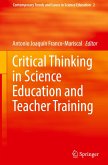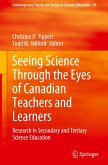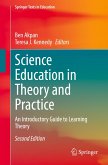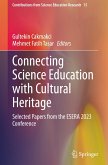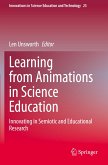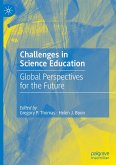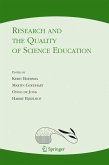A Sociopolitical Turn in Science Education
Towards Post-pandemic Worlds
Herausgegeben:B. Moura, Cristiano
A Sociopolitical Turn in Science Education
Towards Post-pandemic Worlds
Herausgegeben:B. Moura, Cristiano
- Gebundenes Buch
- Merkliste
- Auf die Merkliste
- Bewerten Bewerten
- Teilen
- Produkt teilen
- Produkterinnerung
- Produkterinnerung
This edited volume features a collection of essays on the COVID-19 pandemic and associated crises and its implications for science education research and practice from a socio-political perspective. Taking the pandemic as a starting point - and understanding the pandemic as an event that exposes science-society relationships in their complexities -, this book sets provocations for the science education community, analyzing aspects of its practices, conceptualizations, aims, core values, research traditions, institutions, affectivities, and aesthetics from diverse points of view, and proposing…mehr
Andere Kunden interessierten sich auch für
![Critical Thinking in Science Education and Teacher Training Critical Thinking in Science Education and Teacher Training]() Critical Thinking in Science Education and Teacher Training129,99 €
Critical Thinking in Science Education and Teacher Training129,99 €![Seeing Science Through the Eyes of Canadian Teachers and Learners Seeing Science Through the Eyes of Canadian Teachers and Learners]() Seeing Science Through the Eyes of Canadian Teachers and Learners83,99 €
Seeing Science Through the Eyes of Canadian Teachers and Learners83,99 €![Science Education in Theory and Practice Science Education in Theory and Practice]() Science Education in Theory and Practice76,99 €
Science Education in Theory and Practice76,99 €![Connecting Science Education with Cultural Heritage Connecting Science Education with Cultural Heritage]() Connecting Science Education with Cultural Heritage130,99 €
Connecting Science Education with Cultural Heritage130,99 €![Learning from Animations in Science Education Learning from Animations in Science Education]() Learning from Animations in Science Education121,99 €
Learning from Animations in Science Education121,99 €![Challenges in Science Education Challenges in Science Education]() Challenges in Science Education129,99 €
Challenges in Science Education129,99 €![Research and the Quality of Science Education Research and the Quality of Science Education]() Research and the Quality of Science Education165,99 €
Research and the Quality of Science Education165,99 €-
-
-
This edited volume features a collection of essays on the COVID-19 pandemic and associated crises and its implications for science education research and practice from a socio-political perspective. Taking the pandemic as a starting point - and understanding the pandemic as an event that exposes science-society relationships in their complexities -, this book sets provocations for the science education community, analyzing aspects of its practices, conceptualizations, aims, core values, research traditions, institutions, affectivities, and aesthetics from diverse points of view, and proposing new postures for the future of science education. Some central themes to science education research such as the concepts of scientific literacy and nature of science (among others) are revisited, and new perspectives related to affects, multiculturalism and the knowledge-power relationships are explored.
This book brings together authors from diverse backgrounds, geographic origins, and academic trajectories, composing a truly international volume with a plurality of voices weaving a rich caleidoscope seeking to analyze science education's current state of affairs and propose diverse futures under a socio-political perspective.
This book brings together authors from diverse backgrounds, geographic origins, and academic trajectories, composing a truly international volume with a plurality of voices weaving a rich caleidoscope seeking to analyze science education's current state of affairs and propose diverse futures under a socio-political perspective.
Produktdetails
- Produktdetails
- Contemporary Trends and Issues in Science Education 62
- Verlag: Springer / Springer Nature Switzerland / Springer, Berlin
- Artikelnr. des Verlages: 978-3-031-78585-6
- Seitenzahl: 388
- Erscheinungstermin: 10. Januar 2025
- Englisch
- Abmessung: 241mm x 160mm x 27mm
- Gewicht: 744g
- ISBN-13: 9783031785856
- ISBN-10: 3031785851
- Artikelnr.: 71952094
- Herstellerkennzeichnung
- Springer-Verlag GmbH
- Tiergartenstr. 17
- 69121 Heidelberg
- ProductSafety@springernature.com
- Contemporary Trends and Issues in Science Education 62
- Verlag: Springer / Springer Nature Switzerland / Springer, Berlin
- Artikelnr. des Verlages: 978-3-031-78585-6
- Seitenzahl: 388
- Erscheinungstermin: 10. Januar 2025
- Englisch
- Abmessung: 241mm x 160mm x 27mm
- Gewicht: 744g
- ISBN-13: 9783031785856
- ISBN-10: 3031785851
- Artikelnr.: 71952094
- Herstellerkennzeichnung
- Springer-Verlag GmbH
- Tiergartenstr. 17
- 69121 Heidelberg
- ProductSafety@springernature.com
Cristiano B. Moura is an assistant professor at the Faculty of Education at Simon Fraser University, Canada. He has a PhD in Science, Technology and Education from CEFET-RJ, Brazil. His main research interest is fostering justice-centred science education through historical approaches, drawing mainly from Cultural History of Science, Science Studies and Decolonial theories. He was recently appointed editor-in-chief for the Science & Education journal.
I. Introduction.- 1. Foreword (Catherine Milne, New York University, USA).- 2. In the eye of the storm: for a sociopolitical turn in science education to build post-pandemic worlds (Cristiano B. Moura, Simon Fraser University, Canada).- II. Examining and discussing key concepts and discourses of science education in/for post-pandemic sociopolitical landscapes. 3. Science Education in the Anthropocene: Towards a Socio-Political Interpretation of Vision III (Jesper Sjöström, Malmö University, Sweden).- 4. On trust, identity and scientific literacy: New visions, new hopes (Lucy Avraamidou, University of Groningen, Netherlands Justin Dillon, University College London, UK).- 5. (Re)considering science education in the face of environmental injustices in pre- and post-pandemic worlds: insights from critical & decolonial nature of science (Haira Gandolfi,University of Cambridge, UK).- 6. Nature of Science in socio-political questions: What can science education learn from the pandemic? (Lena Hansson, Kristianstad University, Sweden Fanny Seroglou, Aristotle University of Thessaloniki, Greece).- 7. A Path for Transporting Philosophical Discourse on Trust in Science into School Science (Hagop A. Yacoubian,American University of Armenia, Armenia Arshak Balayan, American University of Armenia, Armenia).- 8. The imbrication of neoliberalism and sustainability: Cautious tales for science and environmental educators (Lyn Carter, Australian Catholic University, Australia).- 9. Troubling Mental health discourses in Science/Medical education in kerala (Aswathy Raveendran, Homi Bhabha Centre for Science Education, TIFR, India.).- 10. How the COVID-19 pandemic paused education & action for ecological justice (Audrey Aamodt, University of Regina, Canada, Jesse Bazzul, University of Regina, Canada).- III. Experiences, tales and local perspectives. 11. The unfinished sociopolitical turn of science education in Mexico in the new curricular framework for public education: a critical consciousness without action? (Liliana Valladares, National Autonomous University of Mexico, Mexico).- 12. Hope and Hate: Experiences, Challenges, and Possibilities of/for Queer Youth in the Aftermath of COVID-19 (Matthew Weinstein,University of Washington-Tacoma, USA Alysa Schafer, Mount Tahoma High School & University of Washington-Tacoma, USA).- 13. Class solidarity as a politico-pedagogical stance towards a justice-oriented science education (German Ahumada Albayay, PUC-Valparaiso, Chile
Paulina Bravo Gonzalez, PUC-Valparaiso, Chile Betzabe Torres Olave,University of Leeds, UK).- 14. When science museums re-imagine their social roles: Responding to the COVID-19 pandemic (Ana Maria Navas, Simon Fraser University, Canada Erminia Pedretti, University of Toronto, Canada).- 15. Brazilian science education scholarship in the recent political scenario(Andreia Guerra, Federal Center for Technological Education of Rio de Janeiro, Brazil Fernanda Ostermann, Federal University of Rio Grande do Sul, Brazil Flavia Rezende, Federal University of Rio Grande do Sul, Brazil).- 16. Decolonizing Natural Sciences, Environmental and Health Education: reflections from a continuous teacher training experience (Ana G. Dumrauf, National University of La Plata, Argentina. Fernando Garelli, National University of Luján, Argentina.Silvina Cordero, National University of La Plata, Argentina.Luciano Iribarren, National University of La Plata & Director of Teacher Education of Buenos Aires Province, Argentina Raúl Esteban Ithuralde, University of Buenos Aires, Argentina).- 17. Toronto science students' education experiences of the COVID-19 syndemic (Steve Alsop, York University, Canada Darren Hoeg, York University, Canada).- IV. Imagining new futures for post-pandemic science education. 18. Slow Violence and Science Education in the Post-pandemic Times (Ajay Sharma, University of Georgia, USA , Ramnarayan Kalyanaraman, Kumaon region of Uttarakhand, India).- 19. Painting vital/viral entanglements: science education as science poethics (Thiago Ranniery, Federal University of Rio de Janeiro, Brazil).- 20. String figuring science and the sociopolitical with/in more-than-human insect worlds (Sara Tolbert, University of Canterbury, New Zealand).- 21. From a multicultural to a multinatural science education: perspectives from an Amerindian perspectivism for a post-pandemic scenario (Matheus Nascimento, Federal University of Rio Grande do Sul, Brazil Cristiano B. Moura, Simon Fraser University, Canada Bruno Ferreira dos Santos,State University of Southwestern Bahia, Brazil ).- 22. Post-pandemic Science & Technology Education: Disaster-precipitated Ecojustice Activism (J. L. Bencze, University of Toronto, Canada Lyn Carter, Australian Catholic University,Australia Isabel Martins, Federal University of Rio de Janeiro, Brazil ).- 23. Reclaiming the future:
agentive-transformative science education in times of crisis (Juliano Camillo, Federal University of Santa Catarina, Brazil João Otavio Garcia da Silva, Federal University of Santa Catarina, Brazil).- 24. Heart-to-heart with science education in (anti-)catastrophic times (Anastasia Sanchez, University of Washington, USA Marc Higgins, University of Alberta, Canada).-IV. Conclusion. 25. In lieu of a conclusion (Cristiano B. Moura, Simon Fraser University, Canada).
Paulina Bravo Gonzalez, PUC-Valparaiso, Chile Betzabe Torres Olave,University of Leeds, UK).- 14. When science museums re-imagine their social roles: Responding to the COVID-19 pandemic (Ana Maria Navas, Simon Fraser University, Canada Erminia Pedretti, University of Toronto, Canada).- 15. Brazilian science education scholarship in the recent political scenario(Andreia Guerra, Federal Center for Technological Education of Rio de Janeiro, Brazil Fernanda Ostermann, Federal University of Rio Grande do Sul, Brazil Flavia Rezende, Federal University of Rio Grande do Sul, Brazil).- 16. Decolonizing Natural Sciences, Environmental and Health Education: reflections from a continuous teacher training experience (Ana G. Dumrauf, National University of La Plata, Argentina. Fernando Garelli, National University of Luján, Argentina.Silvina Cordero, National University of La Plata, Argentina.Luciano Iribarren, National University of La Plata & Director of Teacher Education of Buenos Aires Province, Argentina Raúl Esteban Ithuralde, University of Buenos Aires, Argentina).- 17. Toronto science students' education experiences of the COVID-19 syndemic (Steve Alsop, York University, Canada Darren Hoeg, York University, Canada).- IV. Imagining new futures for post-pandemic science education. 18. Slow Violence and Science Education in the Post-pandemic Times (Ajay Sharma, University of Georgia, USA , Ramnarayan Kalyanaraman, Kumaon region of Uttarakhand, India).- 19. Painting vital/viral entanglements: science education as science poethics (Thiago Ranniery, Federal University of Rio de Janeiro, Brazil).- 20. String figuring science and the sociopolitical with/in more-than-human insect worlds (Sara Tolbert, University of Canterbury, New Zealand).- 21. From a multicultural to a multinatural science education: perspectives from an Amerindian perspectivism for a post-pandemic scenario (Matheus Nascimento, Federal University of Rio Grande do Sul, Brazil Cristiano B. Moura, Simon Fraser University, Canada Bruno Ferreira dos Santos,State University of Southwestern Bahia, Brazil ).- 22. Post-pandemic Science & Technology Education: Disaster-precipitated Ecojustice Activism (J. L. Bencze, University of Toronto, Canada Lyn Carter, Australian Catholic University,Australia Isabel Martins, Federal University of Rio de Janeiro, Brazil ).- 23. Reclaiming the future:
agentive-transformative science education in times of crisis (Juliano Camillo, Federal University of Santa Catarina, Brazil João Otavio Garcia da Silva, Federal University of Santa Catarina, Brazil).- 24. Heart-to-heart with science education in (anti-)catastrophic times (Anastasia Sanchez, University of Washington, USA Marc Higgins, University of Alberta, Canada).-IV. Conclusion. 25. In lieu of a conclusion (Cristiano B. Moura, Simon Fraser University, Canada).
I. Introduction.- 1. Foreword (Catherine Milne, New York University, USA).- 2. In the eye of the storm: for a sociopolitical turn in science education to build post-pandemic worlds (Cristiano B. Moura, Simon Fraser University, Canada).- II. Examining and discussing key concepts and discourses of science education in/for post-pandemic sociopolitical landscapes. 3. Science Education in the Anthropocene: Towards a Socio-Political Interpretation of Vision III (Jesper Sjöström, Malmö University, Sweden).- 4. On trust, identity and scientific literacy: New visions, new hopes (Lucy Avraamidou, University of Groningen, Netherlands Justin Dillon, University College London, UK).- 5. (Re)considering science education in the face of environmental injustices in pre- and post-pandemic worlds: insights from critical & decolonial nature of science (Haira Gandolfi,University of Cambridge, UK).- 6. Nature of Science in socio-political questions: What can science education learn from the pandemic? (Lena Hansson, Kristianstad University, Sweden Fanny Seroglou, Aristotle University of Thessaloniki, Greece).- 7. A Path for Transporting Philosophical Discourse on Trust in Science into School Science (Hagop A. Yacoubian,American University of Armenia, Armenia Arshak Balayan, American University of Armenia, Armenia).- 8. The imbrication of neoliberalism and sustainability: Cautious tales for science and environmental educators (Lyn Carter, Australian Catholic University, Australia).- 9. Troubling Mental health discourses in Science/Medical education in kerala (Aswathy Raveendran, Homi Bhabha Centre for Science Education, TIFR, India.).- 10. How the COVID-19 pandemic paused education & action for ecological justice (Audrey Aamodt, University of Regina, Canada, Jesse Bazzul, University of Regina, Canada).- III. Experiences, tales and local perspectives. 11. The unfinished sociopolitical turn of science education in Mexico in the new curricular framework for public education: a critical consciousness without action? (Liliana Valladares, National Autonomous University of Mexico, Mexico).- 12. Hope and Hate: Experiences, Challenges, and Possibilities of/for Queer Youth in the Aftermath of COVID-19 (Matthew Weinstein,University of Washington-Tacoma, USA Alysa Schafer, Mount Tahoma High School & University of Washington-Tacoma, USA).- 13. Class solidarity as a politico-pedagogical stance towards a justice-oriented science education (German Ahumada Albayay, PUC-Valparaiso, Chile
Paulina Bravo Gonzalez, PUC-Valparaiso, Chile Betzabe Torres Olave,University of Leeds, UK).- 14. When science museums re-imagine their social roles: Responding to the COVID-19 pandemic (Ana Maria Navas, Simon Fraser University, Canada Erminia Pedretti, University of Toronto, Canada).- 15. Brazilian science education scholarship in the recent political scenario(Andreia Guerra, Federal Center for Technological Education of Rio de Janeiro, Brazil Fernanda Ostermann, Federal University of Rio Grande do Sul, Brazil Flavia Rezende, Federal University of Rio Grande do Sul, Brazil).- 16. Decolonizing Natural Sciences, Environmental and Health Education: reflections from a continuous teacher training experience (Ana G. Dumrauf, National University of La Plata, Argentina. Fernando Garelli, National University of Luján, Argentina.Silvina Cordero, National University of La Plata, Argentina.Luciano Iribarren, National University of La Plata & Director of Teacher Education of Buenos Aires Province, Argentina Raúl Esteban Ithuralde, University of Buenos Aires, Argentina).- 17. Toronto science students' education experiences of the COVID-19 syndemic (Steve Alsop, York University, Canada Darren Hoeg, York University, Canada).- IV. Imagining new futures for post-pandemic science education. 18. Slow Violence and Science Education in the Post-pandemic Times (Ajay Sharma, University of Georgia, USA , Ramnarayan Kalyanaraman, Kumaon region of Uttarakhand, India).- 19. Painting vital/viral entanglements: science education as science poethics (Thiago Ranniery, Federal University of Rio de Janeiro, Brazil).- 20. String figuring science and the sociopolitical with/in more-than-human insect worlds (Sara Tolbert, University of Canterbury, New Zealand).- 21. From a multicultural to a multinatural science education: perspectives from an Amerindian perspectivism for a post-pandemic scenario (Matheus Nascimento, Federal University of Rio Grande do Sul, Brazil Cristiano B. Moura, Simon Fraser University, Canada Bruno Ferreira dos Santos,State University of Southwestern Bahia, Brazil ).- 22. Post-pandemic Science & Technology Education: Disaster-precipitated Ecojustice Activism (J. L. Bencze, University of Toronto, Canada Lyn Carter, Australian Catholic University,Australia Isabel Martins, Federal University of Rio de Janeiro, Brazil ).- 23. Reclaiming the future:
agentive-transformative science education in times of crisis (Juliano Camillo, Federal University of Santa Catarina, Brazil João Otavio Garcia da Silva, Federal University of Santa Catarina, Brazil).- 24. Heart-to-heart with science education in (anti-)catastrophic times (Anastasia Sanchez, University of Washington, USA Marc Higgins, University of Alberta, Canada).-IV. Conclusion. 25. In lieu of a conclusion (Cristiano B. Moura, Simon Fraser University, Canada).
Paulina Bravo Gonzalez, PUC-Valparaiso, Chile Betzabe Torres Olave,University of Leeds, UK).- 14. When science museums re-imagine their social roles: Responding to the COVID-19 pandemic (Ana Maria Navas, Simon Fraser University, Canada Erminia Pedretti, University of Toronto, Canada).- 15. Brazilian science education scholarship in the recent political scenario(Andreia Guerra, Federal Center for Technological Education of Rio de Janeiro, Brazil Fernanda Ostermann, Federal University of Rio Grande do Sul, Brazil Flavia Rezende, Federal University of Rio Grande do Sul, Brazil).- 16. Decolonizing Natural Sciences, Environmental and Health Education: reflections from a continuous teacher training experience (Ana G. Dumrauf, National University of La Plata, Argentina. Fernando Garelli, National University of Luján, Argentina.Silvina Cordero, National University of La Plata, Argentina.Luciano Iribarren, National University of La Plata & Director of Teacher Education of Buenos Aires Province, Argentina Raúl Esteban Ithuralde, University of Buenos Aires, Argentina).- 17. Toronto science students' education experiences of the COVID-19 syndemic (Steve Alsop, York University, Canada Darren Hoeg, York University, Canada).- IV. Imagining new futures for post-pandemic science education. 18. Slow Violence and Science Education in the Post-pandemic Times (Ajay Sharma, University of Georgia, USA , Ramnarayan Kalyanaraman, Kumaon region of Uttarakhand, India).- 19. Painting vital/viral entanglements: science education as science poethics (Thiago Ranniery, Federal University of Rio de Janeiro, Brazil).- 20. String figuring science and the sociopolitical with/in more-than-human insect worlds (Sara Tolbert, University of Canterbury, New Zealand).- 21. From a multicultural to a multinatural science education: perspectives from an Amerindian perspectivism for a post-pandemic scenario (Matheus Nascimento, Federal University of Rio Grande do Sul, Brazil Cristiano B. Moura, Simon Fraser University, Canada Bruno Ferreira dos Santos,State University of Southwestern Bahia, Brazil ).- 22. Post-pandemic Science & Technology Education: Disaster-precipitated Ecojustice Activism (J. L. Bencze, University of Toronto, Canada Lyn Carter, Australian Catholic University,Australia Isabel Martins, Federal University of Rio de Janeiro, Brazil ).- 23. Reclaiming the future:
agentive-transformative science education in times of crisis (Juliano Camillo, Federal University of Santa Catarina, Brazil João Otavio Garcia da Silva, Federal University of Santa Catarina, Brazil).- 24. Heart-to-heart with science education in (anti-)catastrophic times (Anastasia Sanchez, University of Washington, USA Marc Higgins, University of Alberta, Canada).-IV. Conclusion. 25. In lieu of a conclusion (Cristiano B. Moura, Simon Fraser University, Canada).


